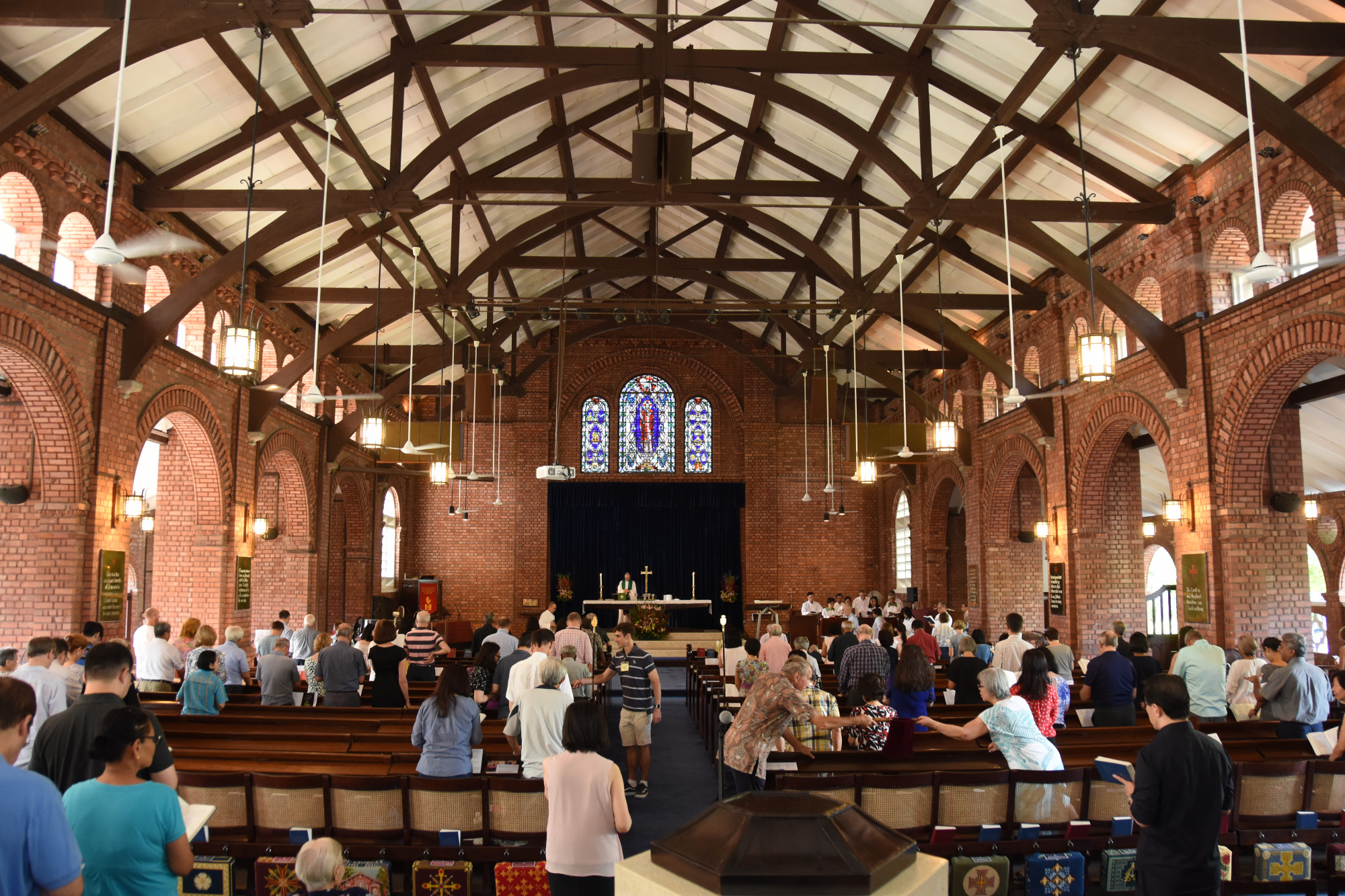A culture of safety: St George’s Church strengthens steps to prevent abuse of children, youth and the vulnerable
Salt&Light // July 14, 2021, 4:16 pm

Multicultural St George's Church, comprising some 500 believers from about 30 nations, has strengthened its policies and procedures to ensure the church remains a safe place for minors and the vulnerable. It also wants the whole church to know where to report – without fear of retribution – any concerns or possible harm. About half of its parishioners are local. All photos from stgeorges.org.sg and taken before Covid.
Early in his ministry, Rev Ian Hadfield saw the police put in the care of the church a child who was beaten at home. The Australian was then serving in a region with a high incidence of child abuse and domestic violence.
Burdened to do something more, he started a group called Men Against Violence to support men needing help, and women needing a safe place from violence at home.
He subsequently introduced policies to safeguard children and youths at the parishes he served in Indonesia and Hong Kong.
In September 2019, he moved to Singapore to take on the role of Vicar at St George’s Church. He is also the Dean of Laos.
With the help of a church member who has extensive international experience in safeguarding, St George’s strengthened its policies and procedures in mid-2020 to protect minors against possible abuse – rather than only responding after harm has occurred.

St George’s Church originally served the spiritual needs of British soldiers when it was built in 1910, though the roots of its ministry date back to the 1860s when the nearby Tanglin Barracks was established. It became a civilian church after British forces withdrew from Singapore in 1971. Its multicultural body of 500 believers come from some 30 nations; about half are local.
St George’s Safeguarding Policy and Procedures (2020) is in line with, but goes beyond what is set out in The Diocese Child Protection Manual (2017) by The Diocese of Singapore.
“We’re not just trying to protect children. We’re actually trying to get a culture of a safe church,” Rev Hadfield told Salt&Light.
Through the new policies, he hopes to create awareness and see a “culture change” in the church.
“Rather than putting the responsibility of child protection on a few people, we want the whole church to be looking out for children and vulnerable adults, and to know who to report to if there is a particular concern or possible harm – without fear of retribution.”
The church has since expanded the safeguards to vulnerable adults. These include people who have mental or physical disabilities, are frail, or are senior in age.
It is in the process of setting up procedures in “other areas that need improvement”. This includes steps to resolve complaints between adults, said Rev Hadfield.
This follows a recent incident where one churchgoer “felt that their personal space was inappropriately invaded by another, and felt that the recourse process was inefficient”, he said.
The two parties have since resolved the issue with each other.
The reality of harm
In Singapore and elsewhere, “the hardest part of raising awareness and achieving change is to accept abuse happens,” said Dawn Baran who took on the role as Parish Safeguarding Advisor at St George’s in early 2020. The advisor, who is not a part of church leadership, is also the key link between the church and the diocese should concerns surface.
“We want to be a church where young people can feel safe, and where spiritual growth can flourish.”
“Abuse is not something that everyone knows about, or wants to know about,” said Baran, who has noticed this in Europe and Asia where she has worked.
It is sobering to note that 90% of cases involving sexual assault of children or adolescents were perpetrated by people known to the victims.
Baran, who is British, first faced the reality of harm to children when she started work as a Health Visitor (a specialist community public health nurse) the UK in the 1990s. She worked with vulnerable families where hardship and poor parenting skills put children at a greater risk of harm. Over the decades, her role in safeguarding expanded to include training and delivering policy change. She has also reviewed serious cases to enable learning from tragic events.
“A safeguarding policy is not a piece of paper on a shelf but an active part of what we do,” said Baran in ensuring that St George’s remains a church where “young people can feel safe, are able to report areas of concern, and spiritual growth can flourish”.
Having policies and procedures to follow is also an effort to prevent cultural misunderstandings in an international congregation. What may be acceptable in one culture may not be the same in another culture, said Rev Ian, citing personal space as an example.
Recruiting helpers
The faith has been brought into question in countries like Australia, England and the United States that have been rocked by sexual abuse in churches. These three countries now have more stringent child protection laws in place.
In Australia, Working with Children Check (WWC) is a mandatory screening process that includes a police background check of individuals engaging in child-related work. The checks for staff are much more stringent than those for volunteers, said Rev Hadfield.
England has a similar check called the Disclosure and Barring Service (DBS) for all who work with children and vulnerable adults.
The police in Singapore currently do not provide such a service.
“We get to know the person and they get to know us as a church.”
St George’s follows advice from The Diocese of Singapore regarding recruitment of volunteers working with children and young people: Volunteers need to be known church members for at least six months before serving.
“We get to know the person and they get to know us as a church,” explained Baran.
Under St George’s policy, they are also asked to provide character references and complete a self-disclosure form which includes questions on previous convictions for offences against children.
Such background checks are even more crucial in churches, such as St George’s, which have a large and often transient expat community.
“In church, you want to get volunteers quickly,” said Rev Hadfield. “But it’s difficult to check the backgrounds and involvement in their previous churches – and whether there were any allegations of inappropriate action – because they come from other countries.”
New volunteers and staff – and soon members of the church council – are required to attend a one-hour training session. Baran is encouraged that interested caretakers and parents have already attended these sessions.
Volunteers and staff can safeguard themselves by not putting themselves in positions where they could be misunderstood.
The session explains why such a policy and procedures are needed. It highlights potential indicators of abuse and steps needed to keep children and youth safe. It also covers duties, and how to raise concerns about inappropriate behaviour and possible abuse.
The training also includes how volunteers and staff can safeguard themselves by not putting themselves in positions where they could be misunderstood: Minimising one-on-one situations, being visible to others, appropriate and inappropriate touch, and thinking about language used especially if on social media. This is also covered in a Code of Conduct.
Volunteers and staff are also required to attend a refresher course each year, where they practise skills and knowledge around possible scenarios.
Those who are part of Parish Safeguarding Team – and hold a higher level of responsibility and decision making – receive more in-depth training related to national legislation and guidance, the local process of referral, and record keeping.
“We are watching”
The policy at St George’s details various forms of abuse, including sexual, physical and emotional. It also includes spiritual abuse, which includes “using a position of spiritual authority to dominate or manipulate another person or group”.
The policy also sets out procedures for managing known offenders or those who may pose a risk.
Said Baran: “We need to be able to support spiritual growth and repentance to past offenders, whilst ensuring that any vulnerable persons remain safe.”
Spiritual abuse includes “using a position of spiritual authority to dominate or manipulate another person or group”.
Said Rev Hadfield: “The Gospel is about repentance, forgiveness and taking responsibility for our past actions.
“It is also about urging and supporting each other to turn away from further sin. The church is a place that ought to be safe for all, supporting each other to increase in godliness and stay away from temptation and sin.”
The church also keeps and eye out for signs of abuse – such as bruising or a change in behaviour – that may come from outside the church.
“We want to be alert to those who may be suffering or struggling with events happening outside the church so that we may signpost to agencies who can help and support families or individuals during challenging times,” said Baran.
Being aware of harm that may be done outside the church can be challenging, especially within certain cultures.
Pinching a child, for example, is a common form of discipline in one country where Rev Hadfield served.
“I’m not sure that physical harm like that was a good way of discipline,” he said.
Rev Hadfield expressed his concerns to parents of a bruised child. He qualified that it was not necessarily caused by the parents.
“It also says that ‘we are watching’.”
Overcoming barriers to reporting
It is hard for every victim and their family to raise concerns, no matter where the abuse occurs, acknowledged Baran.
“There are perhaps even more barriers within a faith setting, where trust and faith in others is fundamental to our belief.
“Disbelief that ‘good people’ or people in a position of trust or leadership can harm is common and a significant barrier to disclosure,” she said.
“The beautiful thing about being Christian is that the Holy Spirit helps us to do difficult things.”
About 2 out of 3 cases of sexual abuse goes unreported to the police, according to an American-based non-profit organisation. Reasons include fear of retaliation, not wanting the perpetrator to get into trouble, and distrust in tangible outcomes from reporting.
“The very impact of abuse damages self-esteem, initiates feelings of shame and can lower self-belief, making the individual incapable of reporting,” she said.
“It is not uncommon for a victim not to know that what they are experiencing is abusive.”
Knowing who to talk to is a starting point.
St George’s has put up posters highlighting the first point of contact within the church. It also includes contacts of the diocese, as well as external statutory agencies (see below) who can support change to stop the harm. It also provides assurances about protecting the confidentiality of victims and whistle-blowers.
“Most children and families are scared that they will be separated, but by working with statutory agencies and changing behaviours, this can be avoided. People are there to help. Don’t dismiss your pain or sadness. Don’t let fear, shame, embarrassment or threats stop you.
“People are there to help. Don’t dismiss your pain or sadness. Don’t let fear, shame, embarrassment or threats stop you.”
“Agencies like the police, social workers, education and health groups help many children every day across the globe to be in a safer place.
“It is difficult to raise a concern, but find the courage to start a conversation,” she advised.
Added Rev Hadfield: “Taking the step to make a report will help other people to do the same. You not only help those who have actually been hurt, but also prevent more people being hurt.”
He added: “The beautiful thing about being Christian is that the Holy Spirit helps us to do difficult things like this. You are not on your own. And you also have a group of people who want to help.”
St George’s Church is willing to share their knowledge with churches looking to improve their culture of safeguarding. Contact them here.
Individuals inspired to improve the culture of safety at their church should first speak with their senior pastor (or equivalent) or the person in charge of their children’s or youth ministry. Establish what policies and procedures the church may have, and if it has a parish safeguarding advisor.
If your church does not have such guidance in place, raise awareness with your church council and senior pastor and work with them to establish a policy and procedure, while adhering to all national policies and guidance.
Where to get help
Call 999 if there is a risk of injury, immediate threat to life or bodily harm.
Community-based Child Protection Specialist Centres:
- Big Love: Tel: 6445-0400 or click here for more information.
- HEART @ Fei Yue: Tel: 6690-1000 or click here for more information.
Family Violence Specialist Centres:
- PAVE: Tel: 6555-0390 or click here for more information.
- TRANS SAFE Centre: Tel: 6449-9088 or click here for more information.
- Care Corner Project StART: Tel: 6476-1482 or click here for more information.
- ComCare: Tel: 1800-222-0000
RELATED STORIES:
How do Sunday Schools meaningfully include children with special needs?
Rising tension in the home during Circuit Breaker? Here’s how to diffuse friction
We are an independent, non-profit organisation that relies on the generosity of our readers, such as yourself, to continue serving the kingdom. Every dollar donated goes directly back into our editorial coverage.
Would you consider partnering with us in our kingdom work by supporting us financially, either as a one-off donation, or a recurring pledge?
Support Salt&Light



